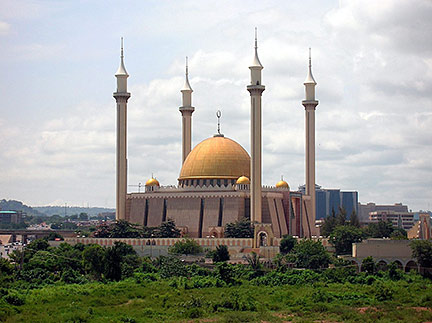The Nigerian Supreme Council for Islamic Affairs (NSCIA) has appointed five new imams for the Abuja National Mosque.
This is contained in a communique issued at the end of the 10th meeting of the Expanded General Purpose Committee (EGPC) of the NSCIA held at the Abuja National Mosque.
“The EGPC proposed, subject to the clearance of the Fatwa Committee of the Council, five additional resident and visiting Imams for the National Mosque as a way of increasing the capacity of the Mosque in discharging its religious and social responsibilities to the ummah,” the communique signed by Prof. Salisu Shehu, Deputy Secretary-General, NSCIA said.
The new imams are Prof. Khalid Abubakar Aliyu (visiting imam, North Central); Dr. Abdulkadir Salman Sholagberu (visiting imam, North Central); Prof. Luqman Zakariyah (resident imam, Southwest), and Ustadh Haroun Muhammad Eze Esq. (resident imam, SouthEast).
- Mikano Motors celebrates Changan night with CS95, X7 launch
- How To Make A Successful Social Media Video Marketing Strategy
The existing four imams are Prof. Ibrahim Makari (visiting imam, Northwest); Prof. Muhammad Kabir (visiting imam, Northeast); Prof. Ilyas Usman (visiting imam, Southeast); while the last, in this category, Sheikh Ahmad Onilewura (resident imam) from Southwest Nigeria is on a sick leave and has not been leading prayers for a while.
The meeting, which was presided over the President-General of NSCIA and Sultan of Sokoto, Alhaji Muhammad Sa’ad Abubakar III, was attended by Muslim leaders across the country including the Deputy President General, NSCIA (South), Alh. Rasaki Oladejo; Etsu Nupe, Alhaji Yahaya Abubakar; Secretary General of NSCIA, Prof. Is-haq Oloyede; Deputy Secretary General of NSCIA, Prof. Salisu Shehu; Secretary-General of Jama’atu Nasril Islam, Prof. Khalid Abubakar; and Executive Secretary of Muslim Ummah of Southwest Nigeria (MUSWEN), Prof. Muslih Yahaya, among others.
The council urged the federal and state governments, the National Assembly and the political class to immediately deflate the current unnecessary tension and unwarranted polarization when what is urgently needed are trust building, extensive consultation and matured and genuine dialogue on the tax reform bills before the national assembly.
The council commended the Federal Government, traditional and religious leaders for the remarkable decrease in cases of communal clashes across the country which could not have been achieved without their critical roles at various levels.
It noted that Nigerians are suffering due to the harsh economic climate and urged the government at all levels to address the concerns of the citizens by making the environment more conducive to business in order to hasten the ease expected from the reforms.
The council “highlighted the relationship between mining and the out-of-school children and urged Muslims to assist the government in curbing the activities of illegal miners in different parts of the country.”
The council urged governments across the three tiers to prioritise food security and education in order to safeguard the immediate and ultimate wellbeing of the citizens.

 Join Daily Trust WhatsApp Community For Quick Access To News and Happenings Around You.
Join Daily Trust WhatsApp Community For Quick Access To News and Happenings Around You.